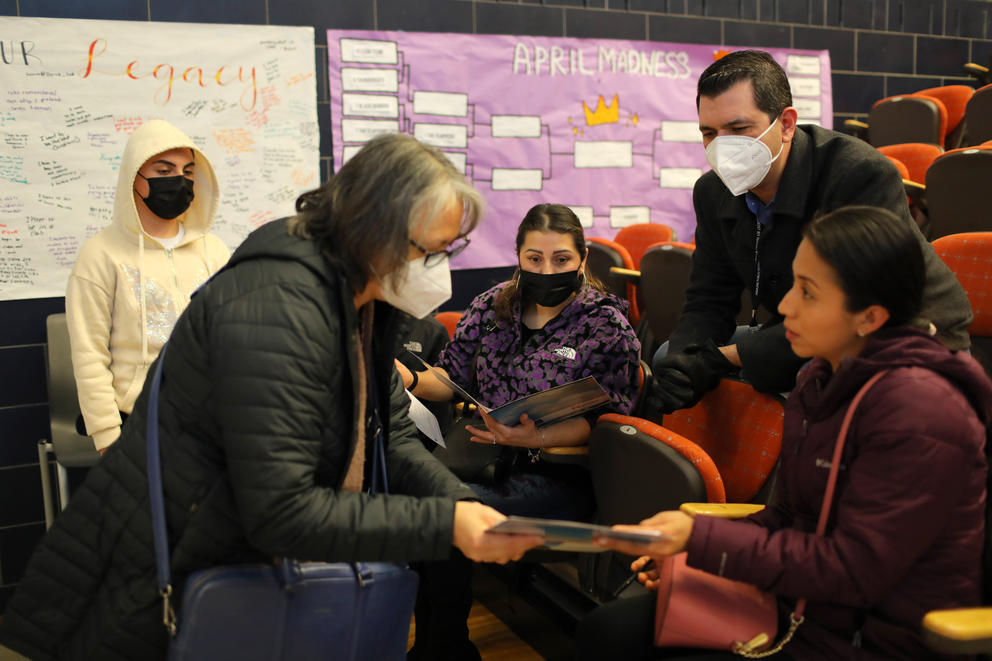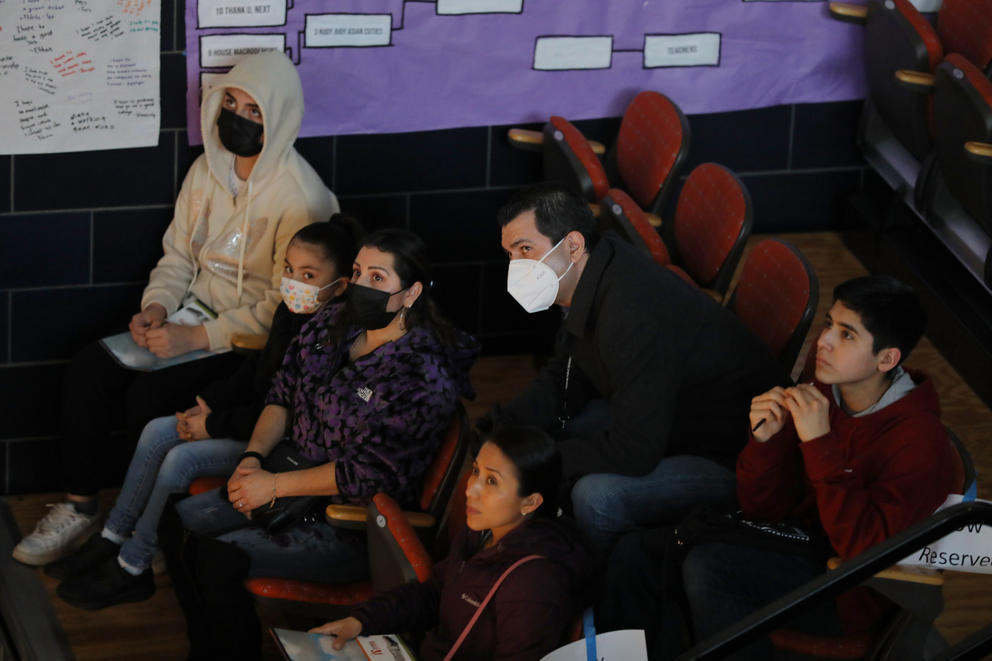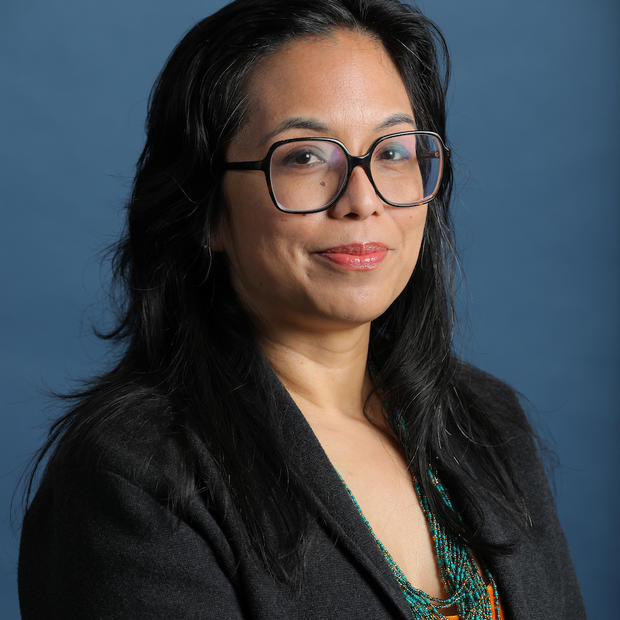While it helps all families who need language assistance, these changes have been pushed by advocates for families of students with disabilities, saying it ensures their civil right to accessing education.
The law also calls for specifically collecting language access data on the needs of families of students with disabilities, who often have high stakes meetings with teachers and administrators to coordinate individualized education programs, called IEPs or 504 plans, which are federally required to map out lesson plans and accommodations for a student’s specific needs in class.
“When it is a regular conversation about how your kid is doing in school, and the child is not in a special program, then maybe it’s easier,” Sanchez Vela said. “But once there is an IEP or a 504 program, then there is some legal terminology and a lot of acronyms, and a lot of terms that are specific so interpreting in that circumstance is a little more challenging.”
“It all starts with language and being inclusive as a human being,” said Moses Perez, program coordinator at Open Doors for Multicultural Families, which advocates for families of color throughout Washington state who have children with disabilities.
The organization started pursuing the changes to the law in 2015, though the challenges of limited language access for families of students with disabilities is not new.
Bernardo Garcia, second from right, an in-house language translator at Highline Public Schools, translates for Laura Gutierrez, center, and Diana Mora, bottom right, during an orientation for incoming freshmen and their families at Raisbeck Aviation High School. Gutierrez and Mora attended the session with their sons, Francisco Gutierrez, left, and Derek Mora, right, on April 20, 2022. Garcia has worked as a Spanish translator for the district for seven months. (Genna Martin/Crosscut)
School districts have a mishmash of policies across the state, which means that there are no uniform policies on offering equitable language access for parents and guardians. In some cases, this meant it fell to the students to interpret for their parents, Perez said.
“So parents were frustrated because their kids were being left behind, [the parents] weren't being included,” Perez said.
Perez said one parent connected to Open Doors asked her child’s south Puget Sound school for an IEP translation in Spanish so she could better advocate during the annual school meeting that determined her child’s learning plan for the year.
“That dictates the entire educational plan of the child,” Perez said. “And so the school principal told her, ‘Look, this is America. English, English, English.’ ”
But after citing state and federal laws, including civil rights laws, the parent — who had taken advocacy training offered by Open Doors — contacted the superintendent, who made sure that the district gave her a translation of her child’s documents. Perez said it shouldn’t come to threatening a lawsuit to get parents what they need in order to understand decisions impacting their kids.
The new law requires school districts to create plans for helping families access interpretation services for parents when they must speak with school officials. School districts must also have staff dedicated to coordinating access to translation services in schools with a high percentage of English language learners. The state’s Office of Superintendent of Public Instruction also will work with the Professional Educator Standards Board to establish best practices in training for interpreters working in education.
It also would establish statewide requirements and credentials for language interpreters at schools, similar to the written and oral tests and continuing education already required to translate for courts, social services and hospitals. The new law also aims to limit calling on untrained people at schools to act as interpreters.
Kisa Hendrickson, chief engagement and partnership officer at Highline Public Schools in Burien, said the law wouldn’t change much for the district, where language access has long been a priority for schools serving a region in which about 99 different home languages are spoken. But the law gives visibility and teeth to the idea of language access for all families, she said.
Advocates say that Highline has been an example of how to offer language access for families and students. In addition to employing two language interpreters as district staff and having numerous bilingual educators and paraeducators, the district uses technology to translate its website content into more than a dozen languages. District officials also recently set up a phone line for all Highline schools to access an on-call interpreter.
Highline’s own in-house interpreters and bilingual staff members have facilitated at 1,500 public events and meetings so far this school year. The bilingual staff members must pass a test in order to be asked to facilitate in language interpretation.
“For us, truly it’s broader than families of students with disabilities. It’s a family’s right to be engaged in their students’ education, so they can navigate and advocate, and it’s our job to work through whatever the barrier may be,” said Hendrickson. She said the district has also had a focus on hiring bilingual staff, especially in its most used non-English languages: Spanish, Somali, Vietnamese and Amharic.
Those barriers are not always just language, especially when it comes to dealing with students in the special education system, which has specific legal protocols.
“A parent can be with a bunch of experts in a room — the barrier might not be a language barrier. It might be the fact that it could be that people are using edu-speak,” Hendrickson said.
However, she added that while Highline has been able to integrate a culture of inclusivity for many years, the district — which has 17,000 students and 35 schools — also has advantages of scale over a smaller district with a more limited budget and staff.
Lita O’Donnell, Highline’s director of family and community partnerships, said that while the new law wouldn’t functionally change practices for the school district, it's good news that some of these practices will become uniform statewide. That can help families get consistency in services no matter where they live in Washington.
“Many of our families in Highline don’t always stay in Highline,” she said.
Emily Fung, program coordinator at Open Doors for Multicultural Families, counts the new law as a win, but said language is not the only cultural challenge in navigating school districts. Black and Native American families, for instance, don’t always have a language barrier that an immigrant Latino family might face, but they may still face challenges when dealing with district administrators and teachers who lack cultural competence.
“One culture does not face the same challenges as another one does,” she said.



